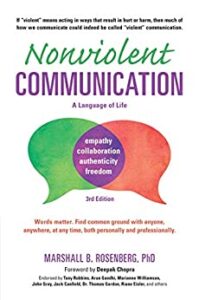Chapter 9 – Connecting Compassionately With Ourselves, page 129.
- We have seen how NVC contributes to relationships with friends and family, at work and in the political arena.
- Its most crucial application, however, may be in the way we treat ourselves.
- When we are internally violent toward ourselves, it is difficult to be genuinely compassionate toward others.
Translating “Have to” to “Choose to”
- Step 1: List on a piece of paper all the things that you tell yourself you have to do.
- Step 2: After completing your list, clearly acknowledge to yourself that you are doing these things because you choose to do them, not because you have to.
- Step 3: After having acknowledged that you choose to do a particular activity, get in touch with the intention behind your choice by completing the statement, I choose to…because I want to…
- With every choice you make, be conscious of what need it serves.
- Ask yourself if there are alternative strategies to get the same need met.
Cultivating Awareness of the Energy Behind Our Actions
- As you explore the statement, “I choose to…because I want…” you may discover the important values behind the choices you’ve made.
- I am convinced that after we gain clarity regarding the need being served by our actions, we can experience those actions as play even when they involve hard work, challenge, or frustration.
- For some items on your list, however, you may uncover one or several of the following motivations:
- For Money
- Money is a major form of extrinsic reward in our society.
- Choices prompted by a desire for reward are costly: they deprive us of the joy in life that comes with actions grounded in the clear intention to contribute to a human need.
- Money is not a “need” as we define it in NVC; it is one of the countless strategies that may be selected to address a need.
- For Approval
- Like money, approval from others is a form of extrinsic reward.
- We are addicted to getting a smile, a pat on the back, and people’s verbal judgments that we are a “good person,” “good parent,” “good citizen,” “good worker,” “good friend” and so forth.
- We do things to get people to like us and avoid things that may lead people to dislike or punish us.
- To Escape Punishment
- To Avoid Shame
- There are some tasks we choose to do just to avoid shame.
- If we do something stimulated solely by the urge to avoid shame, we will generally end up detesting it.
- To Avoid Guilt
- In other instances, we may end up feeling guilty for failing to fulfill other people’s expectations of us.
- There is a world of difference between doing something for others to avoid guilt and doing it out of a clear awareness of our own need to contribute to the happiness of other human beings.
- To Satisfy a Sense of Duty
- When we use language that denies choice (for example, words such as should, have to, ought, must, can’t, supposed to, etc.), our behaviors arise out of a vague sense of guilt, duty, or obligation.
- I consider this to be the most socially dangerous and personally unfortunate of all the ways we act when we’re cut off from our needs.
- When we speak a language that denies choice, we forfeit the life in ourselves for a robotlike mentality that disconnects us from our own core.
- I believe that to the degree that we engage moment by moment in the playfulness of enriching life – motivated solely by the desire for enriching life – to that degree are we being compassionate with ourselves.
- For Money
Summary
- The most crucial application of NVC may be in the way we treat ourselves.
- When we make mistakes, instead of getting caught up in moralistic judgments, we can use the process of NVC mourning and self-forgiveness to show us where we can grow.
- By assessing our behaviors in terms of our own unmet needs, the impetus for change comes not out of shame, guilt, anger, or depression, but out of the genuine desire to contribute to our own and other’s well-being.
- We also cultivate self-compassion by consciously choosing in daily life to act only in service to our own needs and values rather than out of duty, for extrinsic rewards, or to avoid guilt, shame and punishment.



